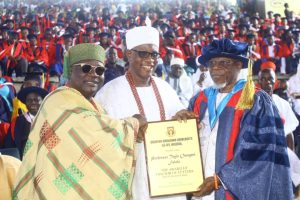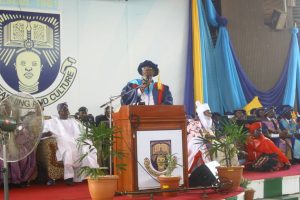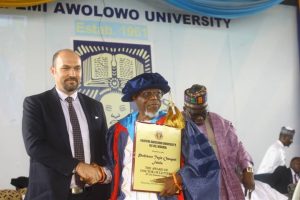Akin Alao
Professor of History
Obafemi Awolowo University
The academy is a lifestyle, and Toyin Falola lives every bit of it in most impactful ways Among Africans, there is often a consensus that formal education is a driving force that is pivotal to development. Consequently, academic life has gradually become necessary for the procurement of the African future. What became important to this development has gradually become the lifestyle of many individuals who have dedicated their lives, even their social lives, to the expansion of African epistemology. The orientation life and activities of Falola connote and underline this fact. He has gradually become a face of African scholarship, being that his work has grown to be multidisciplinary and his lifestyle dynamic enough to fit into many niches of academic life.
Falola started as a school teacher in Pahayi, Ogun State, in 1970, and he remains a teacher even today, amounting to about 53 years of teaching experience. Gradually, he became a lecturer at the University of Ife, now Obafemi Awolowo University, in 1981. Later in 1991, he joined the University of Texas at Austin. He climbed up the ladder of academia to the very summit, where the world has to keep celebrating him. Being conferred with a Doctor of Letters at the Obafemi Awolowo University is an acknowledgement of the strides and victories Falola has won for the continent.

This honour is one of the about 18 Doctor of Letters that has been conferred on him across the world and one of many other honorary degrees to acknowledge his consistency in redefining the descriptions of African culture. Some of these include Doctor of Letters from the University of Ibadan in 2020, Lincoln University in 2015, Federal University, Lokoja in 2021, City University of New York, Staten Island, USA, in 2013, Monmouth University, NJ., USA, in 2007, Federal University of Agriculture, Abeokuta, in 2018, Olabisi Onabanjo University, Nigeria, in 2018, University of Jos, Nigeria in 2015, Tai Solarin University of Education, Ijebu Ode in 2014, Adekunle Ajasin University, Nigeria, in 2013 and still counting.
While he has been recognized by many Universities and institutions across the world, the honour at the Obafemi Awolowo University serves a significant importance because of two things: it is a university Falola sees as his roots and a place of many firsts, and secondly, it is a university that portrays and celebrates the African intellectual culture and prestige, which has made the institution stand out among her peers. Not everyone gets to get the opportunity to be associated with Obafemi Awolowo University, and its position in the education history of the nation and continent is significant. Hence, a Doctor of Letters from such an institution is a lifetime achievement.

Falola deserves his flowers, days if glory and moments if recognition. AsaThe development of his career has been a reflection of his efforts and a high level of commitment. He once admitted that he had lost count of the papers, articles, and newspaper publications he had written. Today, he can boast of not less than 300 books he has written alone or with someone. Without a doubt, this achievement is no joke; it takes an extraordinary individual or academic to reach 100 book publications in Africa; then, one can imagine publishing about 300 books. The quality of thought woven in these texts’ semantic and philosophical composition has created sui generis perspectives about the continent that will always remain monumental references for those who talk about or discuss the continent. Today, there is almost no standard library in the world that has a section about Africa that would not have a piece or collection of Falola’s brilliance, as well as his opinion of certain areas of the continent.
Being one of the most referenced black scholars in the world and one of the most productive scholars in the world has taken a lot of commitment to academics, and the allusion that he represents the lifestyle of scholarship itself is not an aggravated aggrandizement of his person, but evidence of mapped out involvements, dedications and representations. It would not be wrong to call him “Iwin of African scholarship.”

Sometimes, one would wonder how he often pulls these groundbreaking achievements and also marvels at the level he has attained. On October 9, 2023, when he was conferred with the degree of Doctor of Letters at the University of Abuja, Falola “confessed” that he works for about 18 hours per day. Honestly, there is no way one would put in this much work and not come out more like what he is today; this explains the accolades that would not stop coming in for him. His workload could make one say he works with the hand of God or better be convinced that there is a force behind his diligence, but for what it is worth, the accolades are justified.
The contributions of Falola to African History and studies can not be underestimated. He has been able to lead the struggle in the re-narration of African History and the resurfacing practice of its cultures. In The Power of African Cultures, he believes that African Cultures are so strong that they have been able to transcend the different cultural onslaught from slavery, western invasions, colonialism and globalisation. He was able to establish that despite the whirlpool of foreign influence and imposition of foreign cultures, especially through colonialism, African Cultures rose through the ashes of what they are currently. Rather than dying, they have been able to wear the cloaks of modernity, allowing Africans to adopt both global cultures and their cultures. Falola believes the strength and power of the African culture to have been able to survive different ideological changes and other wrong notions and perspectives that tend to put Africa and Africans in a bad light.
More importantly, Falola serves as one of the major voices against the loud and remarkable voices that have painted the African descriptions, philosophies, norms and culture to be barbaric and inferior. While efforts have been made by different scholars, even from outside Nigeria, to correct some of these notions, many did not retell the descriptions from African angles. So, while many scholars would tell African stories and scholarship through foreign methodologies and prerequisites, Falola and a few others have been unapologetic about their positions on the right approach and understanding of the continent. He has been of the opinion that understanding the African epistemology and philosophy may not be properly done with the same cultural and sociological scopes used for other cultures but must allow the overbearing of the African dynamics. Yoruba Gurus: Indigenous Production of Knowledge in Africa is one of the most important books about Africa, its culture and philosophies, as it unfolds the mysteries behind understanding Yoruba epistemology: it gives clues to why many foreign scholars have missed the right approach to understanding Africa. It shows the fact that knowledge production and transmission in Africa is seldom in formal institutions; however, it grows interestingly from organic scholars who have proven themselves worthy of being referred to as scholars in their respective fields. This and the usage of family institutions were the major sources of knowledge in African societies.

The book and many of his other publications directed scholarships through the pathways to understanding African cultures in their dynamic and raw sense. He went on to write more specifically on the root of some African knowledge and cultures, providing remarkable factual discoveries. More importantly, Falola’s achievements could also be traced to his ability to relate the African past and experience to the present with pointers to evidence of reflections and manifestations in contemporary practices. These are a few of the many wonders he has performed in academics.
Seeing this, and the realization of the ideologies behind the orientations that founded the Obafemi Awolowo University, one will realize that the honor is a confirmation of the similarity of ideologies between him and the institution. Also, drawing from his resilience and commitment to what he sets his mind on, with about 18 hours of work, he serves as an image of the dividend of hard work, as a lesson to students and those in academia. The Iwin of African scholarship has fortified himself with enough intentional attempts at personal and career development, and the honour is OAU’s announcement to the world to emulate him.
It is also not arguable that the love Falola has shown toward the university has been quite obvious in his interactions and publications. Besides the recognition of his efforts, this should surely be a homecoming, like a celebrative medal for a child who left the bosom of his mother only to return with accolades, honours, and pride.














You must be logged in to post a comment.